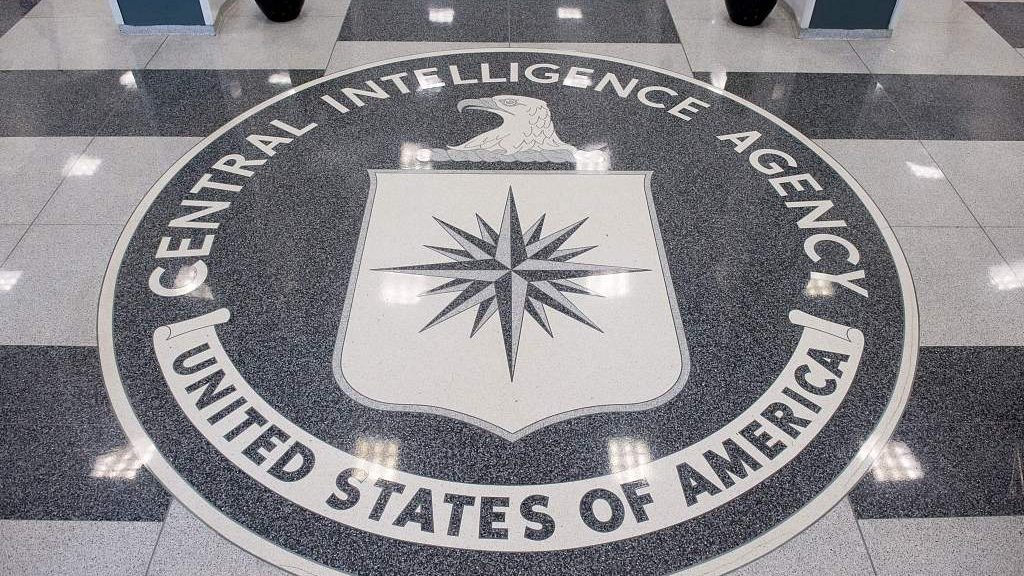
The Central Intelligence Agency seal is displayed in the lobby of CIA Headquarters in Langley, Virginia, the United States. /CFP
The Central Intelligence Agency seal is displayed in the lobby of CIA Headquarters in Langley, Virginia, the United States. /CFP
Editor's note: Hannan Hussain is a foreign affairs commentator and author. He is a Fulbright recipient at the University of Maryland, U.S., and a former assistant researcher at Islamabad Policy Research Institute. The article reflects the author's opinions and not necessarily the views of CGTN.
On March 2, The New York Times pointed to a so-called Western intelligence report claiming officials in Moscow were told by Beijing "not to invade" Ukraine until after the 2022 Beijing Winter Olympics. "The Western intelligence report indicates that senior Chinese officials had some level of knowledge about Russia's war plans or intentions before the invasion started last week," it said.
It comes as no surprise that these baseless allegations are carried primarily on the back of the views of the Joe Biden administration officials. Look to the second week of February, when "senior officials" marketed the myth of China being watchful of the U.S. response to Ukraine. Their underlying suggestion was that this helped Beijing get a pulse of future U.S. reaction to China's sovereign affairs – matters that were always out of bounds for any nation, the U.S. being no exception.
The intelligence hoax on March 2 is no different. Not an inch of evidence is presented to back the toxic thesis that Chinese officials had a determination beforehand of the events unfolding in Ukraine. Rather, the Biden administration's beliefs, fears and anti-China anxieties feature widely in a news story that its outlet is keen to sell at face value.
Consider the fact that key assumptions don't add up. For instance, the article points to considerable disbelief among U.S. and European officials about the timing of Russian President Vladimir Putin's special military operation, and the conclusion of the Beijing 2022 Olympics. "They (officials) find it hard to believe it is mere coincidence," mentions the story. Implicit coordination between Beijing and Moscow is the fiction they wish to feed.
But credible intelligence is not determined by the unfounded beliefs of Western officials. That is a reality that America's compliant press routinely ignores when it comes to China.
For instance, on timelines, plenty was witnessed before and during the course of the Beijing Winter Olympics that Western officials found hard to digest: an ever-strengthening China-Russia partnership, Beijing's principled stance on diplomacy in the Ukraine situation, calls for Russia's security concerns to be respected, and for no state to ensure its security at others' expense. As the Western intelligence playbook suggests, does that sound like Chinese officials talking invasion timelines with their Russian counterparts? What these consistencies do warrant is the rejection of the view that China, at any point, was opposed to cooperation that could benefit the Ukraine issue.

Chinese Foreign Ministry Spokesperson Hua Chunying answers questions about Ukraine crisis on the Regular Press Conference in Beijing, China, February 23, 2022. /The Ministry of Foreign Affairs of the People's Republic of China
Chinese Foreign Ministry Spokesperson Hua Chunying answers questions about Ukraine crisis on the Regular Press Conference in Beijing, China, February 23, 2022. /The Ministry of Foreign Affairs of the People's Republic of China
The second untruth is that months prior, Beijing allegedly told Moscow it "would not try to impede Russian plans and actions" and that Washington was trying to sow discord between them. Again, nothing but the word of American officials to show for it, ending the case for credibility. It is worth noting, however, that behind Washington's China propaganda on the Ukraine-Russia issue is an emerging intelligence weakness: American intelligence has nothing tangible to show for stemming a crisis it believes it predicted. What better way to deflect that ongoing struggle than by playing the China card?
It is time such total disinformation is categorically condemned. The current surge in fighting in Ukraine calls for a departure from bloc confrontation, and makes it imperative for nations to close ranks behind direct and delicate talks between Russia and Ukraine. "Right now we could probably predict whether Ukrainian negotiators will come or not. Let us hope that this happens. Our (negotiators) will be there and will be ready to sit at the negotiations table," said Kremlin spokesman Dmitry Peskov.
That cohesion is dealt a challenge when so-called Western intelligence is used as a guise by officials to discredit a sovereign nation's commitment to a peaceful settlement. It would serve Western intelligence interests better to interrogate rationales for driving Moscow's economy to the ground. Is that a recipe for resolving the Ukraine issue? Besides, if sanctions were an opportunity for conflict resolution, the Ukraine issue would have to identify as one without complex political dynamics and a challenging historical background.
Reality suggests that is simply not the case. And so, attempts to smear Beijing on an issue that needs constructive engagement, lay bare the politics of Western intelligence, and the willingness of select U.S. media outlets to give those falsehoods undivided support. Neither of which shall succeed.
(If you want to contribute and have specific expertise, contact us at opinions@cgtn.com.)

